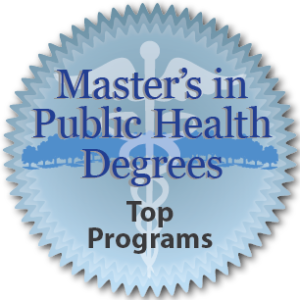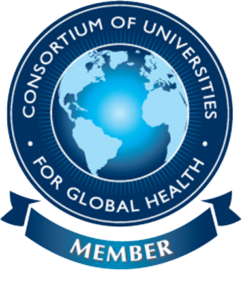 San Diego State Ranked 4th in the Top 10 Best MPH Degrees in the West by Masters in Public Health Degrees.
San Diego State Ranked 4th in the Top 10 Best MPH Degrees in the West by Masters in Public Health Degrees.
Here is an excerpt about San Diego State University’s MPH program from the rankings and helpful FAQs:
“San Diego State University School of Public Health offers an affordable and robust curriculum to boost your professional opportunities. San Diego State’s MPH graduates promote public health locally, nationally and internationally. With strong community collaborations including with the County of San Diego Health and Human Services Agency, SDSU’s location provides opportunity to train a diverse student body and impact health disparities in the region. Six concentrations for the Master of Public Health degree include Biometry, Epidemiology, Environmental Health, Health Management & Policy, Health Promotion & Behavioral Science, and Health Promotion & Behavioral Science (available only online). Additionally, SDSU’s MPH program offers students the opportunity to earn a dual degree with the Master of Social Work and a Master of Latin American Studies. Most concentrations can be completed in 2 years and require a field placement experience as well as a written requirement. The online program can be completed in 18 months, with 8-week courses and 1 week break between courses.
[…]
FAQs
Why pursue a career in public health?
Public health is an exciting and growing field of study with a broad focus on protecting populations through preventing disease and promoting good health. Professionals confront complex health issues including access to health care, infectious disease control, and reducing environmental hazards, violence, substance abuse, and injury. Public Health professionals come from varying educational backgrounds and can specialize in an array of fields.
Who should consider a degree in public health?
Public health is a field that offers job opportunities to suit a variety of interests and skills–whether math-oriented, people-focused, or research-based. Public health is ideal for those who gain satisfaction in knowing they are working to improve the lives of others.
Where do public health professionals work?
Professionals of public health occupy both public and private sectors. The public sector includes local, state, or federal health departments. Public health professionals may also work at a university as researchers. Working for a non-profit organization can land a job in health advocacy, policy, or research for organizations such as the American Cancer Society or Red Cross, or a non-profit that focuses on specific health issues. Work in the private sector may be with a pharmaceutical company, health insurance company or hospital.
What kind of job titles might I have once I earn my MPH degree in the West?
Job titles you may have include health communications specialist, health research scientist, director of programs, director of services, or public health management analyst, to name just a few. You may work in the public or private sector, a governmental agency, academia, research, industry or community based organizations.
What is an entry level payscale for a professional with a MPH?
There is a wide range of salaries that you can expect to earn in the field of public health, depending on which direction you choose. Information from the Bureau of Labor Statistics at BLS.Gov can help give you more information regarding payscale in your area of interest and geographical area.
How will a Master of Public Health degree from the West advance my career?
A Master of Public Health degree can help prepare you for work in a health related agency or organization, possibly in a leadership capacity. The MPH can also prepare you for a career in public health research or further education. The concentration area of study will help guide career opportunities in public health.
What kind of Bachelor’s degree is most beneficial to being accepted into a top MPH program in the West?
Most MPH programs are interested in a potential candidate’s academic performance in general as well as a demonstrated interest in public health rather than a degree title. There really is no best degree to pursue as a Bachelor’s degree.
How long does the MPH degree take to complete?
Full-time programs are typically 2-2.5 years long, while part-time students may take up to 7 years to complete, depending on the university. Some accelerated programs may be completed in about a year.
What are some new or unique concentrations that may be interesting?
One Health: The One Health concentration focuses on the interconnectedness of health among human, animal and environmental systems and how to work within a multi-disciplinary team.
Physical Activity: This concentration will help prepare MPH students for a variety of careers that involve developing, implementing and evaluating community-based programs designed to promote physically active lifestyles.
Indigenous People: A concentration related to indigenous people will help develop the knowledge of history, policy, health determinants and ethics needed to address and eliminate the inequities faced by Indigenous people that involve a broad array of topics related to health.
Are there benefits to earning a MPH degree in a traditional format compared to the more flexible online formats available?
For those who prefer face to face interaction and networking, a traditional campus experience may better fit your needs. Some may find it easier to stay on track with less distractions with an on campus format. If flexibility is what you need or you are not able to pick up and relocate due to personal responsibilities, a good online program may be just the ticket. Although most are asynchronous, some distance programs are synchronous and require you to meet at a scheduled time weekly and participate in class live at that time.
What if these MPH West schools are too far for me to commute to?
Look for a program closer to home or investigate programs offering remote study options. Speak to your school of interest about graduate student housing, scholarship opportunities and how to meet your academic goals. Graduate students focus on their goals and look for ways to accomplish them. Exhaust the possibilities to find a way to make your MPH a reality. Some schools offer flexible options and accelerated formats.
How can I finance my degree?
Graduate school is often financed through a variety of methods that may include loans, scholarships, savings, employer financing, research fellowships or teaching assistantships. Financial aid packages vary so talk to your school of interest about your goals and financial needs.
Will a graduate degree in public health really make a difference in the world today?
In the last 100 years, public health initiatives have added 25 years to the life expectancy of people in the United States. According to the Center for Disease Control, public health’s greatest health improvements in the last century include: Workplace safety, infectious disease control, food safety, mother baby health, decline in death from heart disease and stroke, motor vehicle safety, immunizations, family planning, fluoridated drinking water, and the health hazard of tobacco use. What health initiatives will make this next century a healthier one in the US and abroad and what role will you play?
What is the professional organization for public health?
The American Public Health Association (APHA) is the public health organization for public health professionals. With a vision to “Create the healthiest nation in one generation,” APHA in concerned with the health of people and communities at large, promoting scientifically based perspectives towards a healthier society. APHA has an effect on federal policy out of its nearly 150-year perspective, bringing together members from all fields of public health. Their mission is to improve the health of the public and achieve equity in health status. Their values reflect the beliefs of their members from all disciplines of public health and over 40 countries.”





